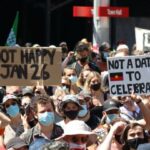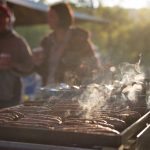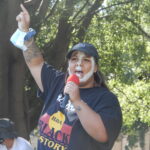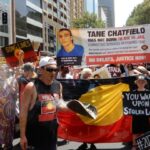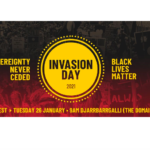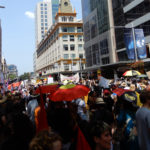Take a Stand Against Injustice This Invasion Day, Says Dunghutti Activist Paul Silva
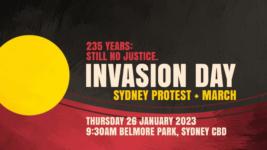
The 26 January this year marks 235 years since British ships arrived at Kamay-Botany Bay. The pretext for the invasion was that English gaols were bursting with inmates, so the nation thought it wise to spend 252 days sailing 700-odd inmates to this continent for incarceration.
At this time, Britain was heavily invested in empire-building, mind you. British colonies had been established in Ireland, India and across the Caribbean, yet, when it came to the great southern land, England was merely interested in room to build a prison, rather than any resource grab, so it’s said.
But while its people were stationed down here, Britain decided to appropriate the entire landmass permanently, as it had determined that the continent was terra nullius, meaning there were no sovereign peoples occupying it.
Of course, this finding posed a problem as there were hundreds of Indigenous nations occupying the land, so the British embarked on a genocidal landgrab that continues to this day, under various guises that aren’t as easily identified as the initial invasion and massacres were.
Ongoing colonial project
As Dunghutti activist Paul Silva points out, the colonial project is genocidal in nature, which is evidenced by the high numbers of First Nations deaths in custody, which continue despite the Royal Commission. Indeed, there have been at least 530 such deaths since it released its report in 1991.
Silva’s uncle David Dungay Junior died at the age of 26, as he was being detained in the hospital at Long Bay Gaol in late 2015. Specialist guards were captured on film wrestling him face down onto a prison bed, as he repeatedly called out that he couldn’t breathe.
Another aspect of the colonial project that conveys it’s alive and growing, is the continuing theft of First Nations’ land, with the most recent example in NSW being the National Native Title Tribunal having gifted energy corporation Santos large tracts of Gomeroi Country.
The tribunal handed over 95,000 hectares of mainly Pilliga Forest to Santos right on Christmas, so it can drill around 850 coal seam gas wells straight through the Great Artesian Basin. The Gomeroi Nation has been contesting this move to destroy its land for about a decade now.
A day of mourning
The 26 January this year is also the first Invasion Day following the election of the Albanese government. And since Labor took office last May, it’s been prioritising the staging of a referendum on whether to establish an Indigenous voice to parliament.
The Voice would comprise of a First Nations body to provide the government with advice on policies and law that affects Indigenous people. However, as opponents point out, this advisory role is a far weaker position than the recognition of sovereignty under treaties.
Sydney Criminal Lawyers spoke to Paul Silva about this year’s Sydney Invasion Day protest, the lack of progress that has been made on Aboriginal deaths in custody over the years he’s been mobilising against them, and why the wider public ought to attend rallies this 26th January.
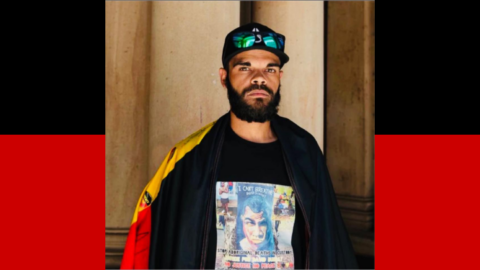
This year’s Invasion Day protest is set to commence at Sydney’s Belmore Park at 9.30 am. These events have been growing in numbers over the last decade, with a broad cross section of the community participating.
Paul, can you talk about the significance of these events, and what it means for support to be building?
It’s important to raise awareness about how First Nations people have been treated since the First Fleet arrived.
Gradually, every year, more numbers are coming out, which is due to the inhumane treatment that First Nations people are facing being confronted and raised on social media and in the public eye more than it used to be.
These issues include deaths in custody and land rights.
Invasion Day protests are an important part of the broader First Nations campaign for rights and self-determination following the colonisation of this continent.
Broadly speaking, how would you say First Nations people are faring in settler colonial Australia today?
It’s not progressing. If anything, it’s getting worse. We still live in a society where we’re constantly targeted, and as a result, people die in custody and more Aboriginal land is stolen.
But, hopefully, in the near future, there’s some progress.
The Sydney Invasion Day rally is being hosted by Justice for David Dungay Junior and FISTT. David Dungay was your uncle. He lost his life on 29 December 2015 at Long Bay Gaol.
Two weeks ago, marked eight years since David lost his life at the hands of prison guards. How do you consider justice for David Dungay Junior today?
Justice for our family would be to have those guards and Justice Health staff held accountable for their actions, as we have been asking for years.
There’s no progress within the government regarding justice for David at this stage. But we’re going to continue.
I’m determined to see the justice and accountability that my uncle, David Dungay, deserves. But in saying that, it’s going to be an ongoing battle as it has been for the last seven to eight years.
It all comes down to independent investigations and inquiries, which is something that not just our family, but other families have asked for. It’s still falling on deaf ears, and that’s yet to change.
The world has seen the traumatic footage of David’s death. The evidence speaks for itself.
I still don’t know how people get away with these things, but it shows how colonialism continues on from the day First Nations land was first invaded.
It continues with deaths in custody and the continuous bulldozing of our land.
What are your thoughts on NT police constable Zachary Rolfe, who stood trial for the 2019 murder of Kumanjayi Walker, being acquitted of murder last March?
That family sat through a traumatic process. Solidarity to them.
That process showed what many families are put through in the coronial system and the criminal court system, and it showed the way the Australian government deals with issues regarding First Nations people.
Despite an escalation in the Stop Blak Deaths in Custody campaign over recent years, they seem to be on the increase. Why aren’t we seeing any progress on this crisis?
The current Albanese government doesn’t care about these issues. Otherwise, it would have started dealing with them when it was put in place. It saddens me that this continuously happens.
So many families have sat through these coronial inquiries for their loved ones, as well as the 2021 NSW parliamentary inquiry.
We’ve said what needs to be put in place for future deaths in custody and to make a stand. We’re not being treated fairly on our own land.
Last May saw the Albanese government voted into office. It’s prioritised holding a referendum on enshrining an Indigenous voice to parliament in the Australia Constitution.
The Voice, a body to advise parliament on Indigenous affairs, is being heralded as the way forward. What are your thoughts on the proposal?
There have been many voices over many years demanding many forms of justice and accountability for Aboriginal and Torres Strait Islander rights and issues, and those have fallen on deaf issues.
A Voice to Parliament isn’t going to resolve these issues that are causing death, brutality, the stealing of our land and the bulldozing of our sacred sights.
And lastly, Paul, as mentioned before, Invasion Day rallies have been growing over recent years. Why should people make the effort to participate this year?
These are ongoing issues that started when the First Fleet arrived. It’s not a day to be celebrated.
To put it in perspective, imagine if a group of people ran into your relative’s house, murdered the women, stole the children and made the men slaves, you would not celebrate that day. No one in their right mind would.
It’s time to make a stand and look at the bigger picture regarding what’s really going on and what people are really celebrating on 26 January.
They’re out there celebrating murder and genocide. That doesn’t make a person human.
Come and stand with us. Make a stand to abolish the day and demand human rights and justice for First Nations people.
There has to come a time in Australia, when First Nations people and non-Indigenous people take a stand against these issues, because, at the end of the day, families are suffering.
Governments keep coming along with ideas like the Voice, but there remains no accountability and our lands are not returned.
We’re still being killed in custody. We’re still being profiled by police and law enforcement on the streets.
It happens in the local store. It happens in employment. In health facilities, people are losing their lives because of it.
It is a continuing genocide that’s killing us off. It’s like when the First Fleet arrived, but instead of doing murders en mass, they’re now doing it behind closed doors, like deaths in custody or a death in healthcare due to negligence because of skin colour.
My call is for everyone, First Nations and the non-Indigenous, to attend rallies across the country that are organised locally to them, so they get out and take a stand.


